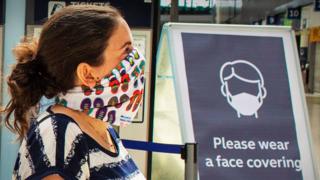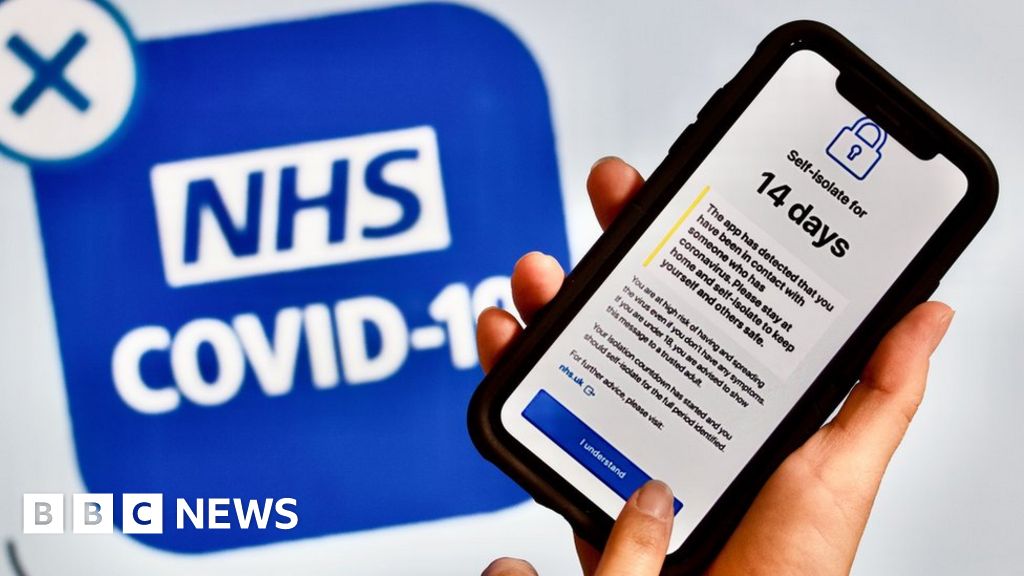 Image copyright
Alamy
Image copyright
Alamy
Face coverings on public transport are now compulsory in England and Scotland.
This is in line with new World Health Organization (WHO) advice. It says non-medical face coverings should be worn in public where social distancing is not possible.
In England, they should also be worn by hospital staff, outpatients and visitors.
What are the face covering rules on public transport?
Anyone travelling by bus, train, ferry or plane in England should wear a face covering to help reduce the risk of coronavirus transmission.
The new rules coincided with a further easing of lockdown - including the return to class of some secondary school pupils and the reopening of non-essential shops.
The number of people using public transport is expected to increase.
The government stresses people should:
Continue home working if possible Avoid public transport if they can't work from home Avoid the rush hour on public transportSome passengers will be exempt from the new rules including:
Children under 11 People with disabilities Those with breathing difficulties Anyone travelling with someone who relies on lip readingIf it is "reasonably necessary" for you to eat or drink you can remove the face covering to do so.
The rules will apply only on public transport - not while waiting - but the rail industry will ask people to cover their face as they enter a station.
People could be refused travel if they don't follow the rules. They could also be fined, but this will be the last resort.
Public transport excludes cruise ships, school transport, taxis and private hire vehicles. However, ride-sharing company Uber is making face coverings compulsory.
Image copyright Getty ImagesWhat about the rest of the UK?
In Scotland, it is compulsory to wear face coverings on all public transport, including buses, planes, ferries and taxis.
As in England, there are some exemptions. Children under five, people with breathing difficulties, and those with a physical condition which makes it hard to keep a mask in place will not be required to cover their face. Drivers behind a protective shield will be exempt.
The Scottish government already recommends wearing a face covering in some enclosed public spaces, such as shops, and has said it will consult on making them mandatory there as well.
People in Wales are being asked to wear non-medical face coverings where social distancing is not possible - including public transport. But the government stopped short of making their use mandatory.
Similar advice has been given by Northern Ireland's first minister and deputy first minister.
Where am I supposed to get a face covering?
The government has been careful to use the term "face covering" rather than "face mask".
Transport Minister Grant Shapps said passengers should wear "the kind of face covering you can easily make at home" - with surgical masks kept for medical use.
Image copyright Getty ImagesCommon household items, such as cotton fabric from old T-shirts or bedding, can be turned into face coverings.
The BBC has created a guide on how to make your own. The government has issued its own advice too.
What are the face covering rules in hospitals?
All hospital visitors and outpatients in England are being told to wear non-medical face coverings - although no-one will be denied care, and coverings will be provided by hospitals if necessary.
NHS England has now lifted its suspension of hospital visiting - but rules are at the discretion of individual trusts.
Health staff now have to wear surgical masks at all times, in all areas.
The most protective mask for health staff is an FFP3 or, alternatively, an N95 or an FFP2.
What is the World Health Organization advice?
The WHO has updated its guidelines on face masks - and now recommends non-medical, fabric coverings should be worn by anyone aged under 60 on public transport and in some enclosed work environments.
It says they could provide "a barrier for potentially infectious droplets" in areas where "physical distancing of at least one metre is not possible".
The WHO recommends people aged over 60, or anyone of any age with an underlying health condition, should wear a medical-grade mask in those environments.
The same goes for anyone with Covid-19 symptoms (even mild) and those caring for them.
Healthcare workers should wear medical masks when providing any patient care.
Do face coverings work?
Coronavirus is spread when droplets are sprayed into the air when infected people talk, cough or sneeze. Those droplets can then fall on surfaces.
Homemade cloth face coverings can help reduce the spread from people who are contagious but have no symptoms or are yet to develop symptoms. This is called asymptomatic or presymptomatic transmission.
Scientists in Singapore suggest the contagion risk is especially high in the 24-48 hours before an infected person is even aware they might have the disease.
There is a risk of contamination when taking a face covering on and off - the WHO has issued advice.

 5 years ago
822
5 years ago
822 

